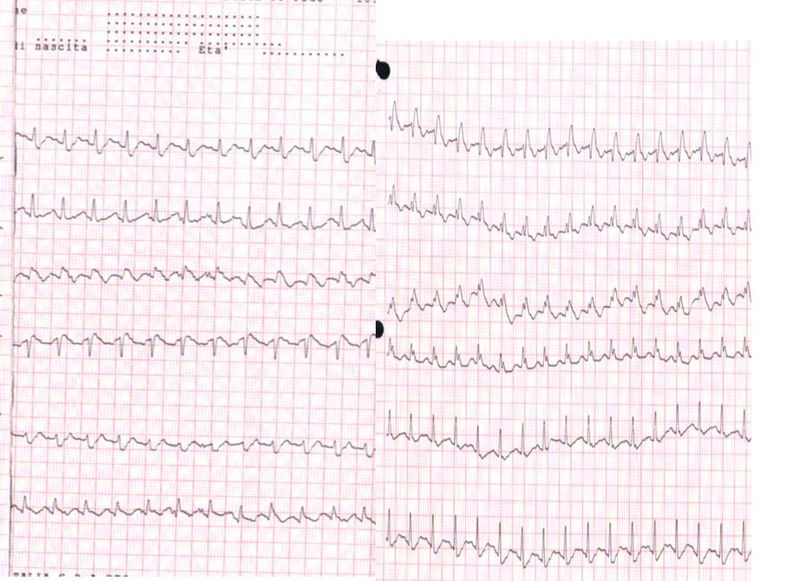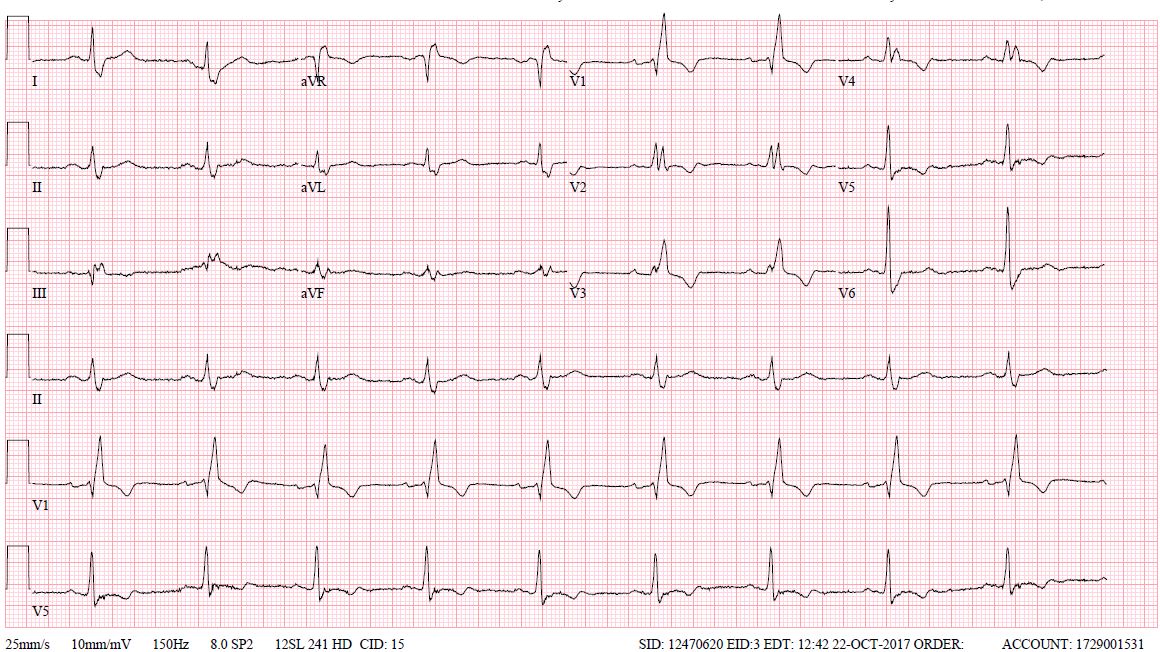[1]
Tusscher KH, Panfilov AV. Modelling of the ventricular conduction system. Progress in biophysics and molecular biology. 2008 Jan-Apr:96(1-3):152-70
[PubMed PMID: 17910889]
[2]
Sarda L, Colin P, Boccara F, Daou D, Lebtahi R, Faraggi M, Nguyen C, Cohen A, Slama MS, Steg PG, Le Guludec D. Myocarditis in patients with clinical presentation of myocardial infarction and normal coronary angiograms. Journal of the American College of Cardiology. 2001 Mar 1:37(3):786-92
[PubMed PMID: 11693753]
[3]
Patil AR. Risk of right bundle-branch block and complete heart block during pulmonary artery catheterization. Critical care medicine. 1990 Jan:18(1):122-3
[PubMed PMID: 2293963]
[4]
Rotman M, Triebwasser JH. A clinical and follow-up study of right and left bundle branch block. Circulation. 1975 Mar:51(3):477-84
[PubMed PMID: 1132086]
[5]
Horowitz LN, Alexander JA, Edmunds LH Jr. Postoperative right bundle branch block: identification of three levels of block. Circulation. 1980 Aug:62(2):319-28
[PubMed PMID: 7397974]
[6]
Ohmae M, Rabkin SW. Hyperkalemia-induced bundle branch block and complete heart block. Clinical cardiology. 1981 Jan:4(1):43-6
[PubMed PMID: 7226590]
[7]
Stein PD, Matta F, Sabra MJ, Treadaway B, Vijapura C, Warren R, Joshi P, Sadiq M, Kofoed JT, Hughes P, Chabala SD, Keyes DC, Kakish E, Hughes MJ. Relation of electrocardiographic changes in pulmonary embolism to right ventricular enlargement. The American journal of cardiology. 2013 Dec 15:112(12):1958-61. doi: 10.1016/j.amjcard.2013.08.030. Epub 2013 Sep 25
[PubMed PMID: 24075285]
[8]
Agarwal S, Tuzcu EM, Desai MY, Smedira N, Lever HM, Lytle BW, Kapadia SR. Updated meta-analysis of septal alcohol ablation versus myectomy for hypertrophic cardiomyopathy. Journal of the American College of Cardiology. 2010 Feb 23:55(8):823-34. doi: 10.1016/j.jacc.2009.09.047. Epub
[PubMed PMID: 20170823]
Level 1 (high-level) evidence
[9]
LENEGRE J. ETIOLOGY AND PATHOLOGY OF BILATERAL BUNDLE BRANCH BLOCK IN RELATION TO COMPLETE HEART BLOCK. Progress in cardiovascular diseases. 1964 Mar:6():409-44
[PubMed PMID: 14153648]
[11]
Denes P, Wu D, Dhingra RC, Amat-y-leon F, Wyndham C, Rosen KM. Eectrophysiological observations in pateints with rate dependent bundle branch block. Circulation. 1975 Feb:51(2):244-50
[PubMed PMID: 1112004]
[12]
Eriksson P, Hansson PO, Eriksson H, Dellborg M. Bundle-branch block in a general male population: the study of men born 1913. Circulation. 1998 Dec 1:98(22):2494-500
[PubMed PMID: 9832497]
[13]
Arnsdorf MF. The cellular basis of cardiac arrhythmias. A matrical perspective. Annals of the New York Academy of Sciences. 1990:601():263-80
[PubMed PMID: 2221691]
Level 3 (low-level) evidence
[14]
LEATHAM A. Splitting of the first and second heart sounds. Lancet (London, England). 1954 Sep 25:267(6839):607-14
[PubMed PMID: 13202450]
[15]
Surawicz B, Childers R, Deal BJ, Gettes LS, Bailey JJ, Gorgels A, Hancock EW, Josephson M, Kligfield P, Kors JA, Macfarlane P, Mason JW, Mirvis DM, Okin P, Pahlm O, Rautaharju PM, van Herpen G, Wagner GS, Wellens H, American Heart Association Electrocardiography and Arrhythmias Committee, Council on Clinical Cardiology, American College of Cardiology Foundation, Heart Rhythm Society. AHA/ACCF/HRS recommendations for the standardization and interpretation of the electrocardiogram: part III: intraventricular conduction disturbances: a scientific statement from the American Heart Association Electrocardiography and Arrhythmias Committee, Council on Clinical Cardiology; the American College of Cardiology Foundation; and the Heart Rhythm Society. Endorsed by the International Society for Computerized Electrocardiology. Journal of the American College of Cardiology. 2009 Mar 17:53(11):976-81. doi: 10.1016/j.jacc.2008.12.013. Epub
[PubMed PMID: 19281930]
[16]
Bilchick KC, Kamath S, DiMarco JP, Stukenborg GJ. Bundle-branch block morphology and other predictors of outcome after cardiac resynchronization therapy in Medicare patients. Circulation. 2010 Nov 16:122(20):2022-30. doi: 10.1161/CIRCULATIONAHA.110.956011. Epub 2010 Nov 1
[PubMed PMID: 21041691]
[17]
Gussak I, Antzelevitch C, Bjerregaard P, Towbin JA, Chaitman BR. The Brugada syndrome: clinical, electrophysiologic and genetic aspects. Journal of the American College of Cardiology. 1999 Jan:33(1):5-15
[PubMed PMID: 9935001]
[18]
Okmen E, Erdinler I, Oguz E, Akyol A, Turek O, Cam N, Ulufer T. An electrocardiographic algorithm for determining the location of pacemaker electrode in patients with right bundle branch block configuration during permanent ventricular pacing. Angiology. 2006 Oct-Nov:57(5):623-30
[PubMed PMID: 17067986]
[19]
Zhang ZM, Rautaharju PM, Soliman EZ, Manson JE, Cain ME, Martin LW, Bavry AA, Mehta L, Vitolins M, Prineas RJ. Mortality risk associated with bundle branch blocks and related repolarization abnormalities (from the Women's Health Initiative [WHI]). The American journal of cardiology. 2012 Nov 15:110(10):1489-95. doi: 10.1016/j.amjcard.2012.06.060. Epub 2012 Aug 2
[PubMed PMID: 22858187]
[20]
Wagner GS, Macfarlane P, Wellens H, Josephson M, Gorgels A, Mirvis DM, Pahlm O, Surawicz B, Kligfield P, Childers R, Gettes LS, Bailey JJ, Deal BJ, Gorgels A, Hancock EW, Kors JA, Mason JW, Okin P, Rautaharju PM, van Herpen G, American Heart Association Electrocardiography and Arrhythmias Committee, Council on Clinical Cardiology, American College of Cardiology Foundation, Heart Rhythm Society. AHA/ACCF/HRS recommendations for the standardization and interpretation of the electrocardiogram: part VI: acute ischemia/infarction: a scientific statement from the American Heart Association Electrocardiography and Arrhythmias Committee, Council on Clinical Cardiology; the American College of Cardiology Foundation; and the Heart Rhythm Society. Endorsed by the International Society for Computerized Electrocardiology. Journal of the American College of Cardiology. 2009 Mar 17:53(11):1003-11. doi: 10.1016/j.jacc.2008.12.016. Epub
[PubMed PMID: 19281933]

